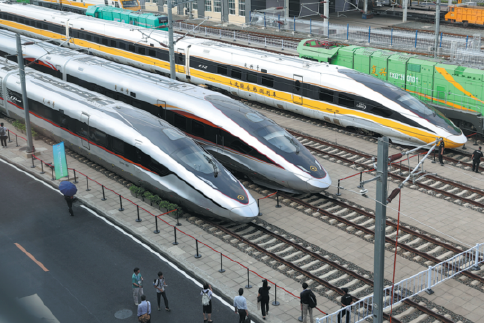Investors flock to Chinese financial assets

Global investors are showing greater interest in Chinese financial assets as the nation's shining economic prospects help them to diversify their allocations from US dollar-denominated assets, a senior executive at global wealth manager UBS said.
In line with that trend, UBS is committed to functioning as a bridge for global investors to invest in Chinese assets as the country widens its financial opening-up, said Thomas Fang, head of China global markets at UBS.
"We've been pounding the table that the overall underweight of the China assets would not be sustainable. With the September policy pivot (which sharpened policymakers' commitment to economic growth), more and more investors are gaining confidence in the Chinese markets, both A and H shares," Fang said in an exclusive interview with China Daily.
The confidence has been underpinned by the country's robust economic growth this year, Fang said, with UBS having upgraded its full-year China GDP growth forecast to 4.7 percent. The Chinese economy expanded 5.3 percent in the first half.
Global investors' push for broader asset allocation across regions and asset classes is also boosting demand for Chinese assets, Fang said, given that trade negotiation outcomes between the United States and other economies can drive significant fluctuations of a particular asset class.
"Global investors are really looking at diversifying away from US dollar assets. That could benefit European and Chinese equities," Fang said.
"Assets listed in Hong Kong present themselves as a more attractive alternative to US dollar assets. Investors can potentially participate in the upside from the fundamentals and also the attractive valuation of Chinese companies. The Hong Kong dollar is pegged to the US dollar, which also drives demand."
In remarks made on the sidelines of the 16th Annual Meeting of the New Champions, also known as the Summer Davos, in Tianjin recently, Fang said the A-share market, with its depth and breadth and more attractive valuation versus H shares, has the potential to catch up with the performance of the H-share market.
The A-share benchmark Shanghai Composite Index rose 0.5 percent to close at 3534.48 points on Friday, marking the fourth consecutive week of increase, up 2.61 percent so far this month. Hong Kong's Hang Seng Index has risen about 3 percent this month.
UBS sees leading companies in China's technology and internet sectors demonstrating their potential for earnings, with some of them not only growing domestically but also thriving overseas, Fang said.
"If that uncertainty (surrounding tariff talks and investment restrictions between China and the US) is removed, global investors will definitely look to the tech sectors and many names in the new consumption sector. All those can potentially propel the valuation of Chinese equities."
The increased interest by global investors in Chinese assets, combined with China's steps for financial opening-up, means UBS sees more development opportunities to act as a channel for global investors into the Chinese market, seeking more licenses to expand its business in China.
"Our local operating entity, UBS Securities, has just become 100 percent fully owned. With that, we're looking at plans to grow our operations further."
At the 2025 Lujiazui Forum in June, China's top financial regulators unveiled a raft of new opening-up measures, including widening foreign institutions' access to financial business pilot programs and improving the qualified foreign institutional investor, or QFII, program to facilitate overseas investment.
Fang said that recent opening-up policies offer global investors more instruments — ranging from commodity futures to listed options — to invest in China under the QFII scheme, facilitating their risk management and helping them take bigger positions here.
Contact the writers at zhoulanxv@chinadaily.com.cn




































